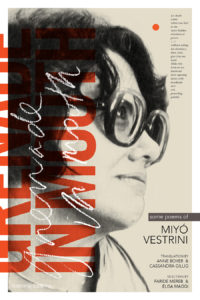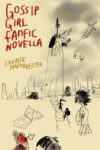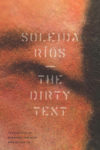Tr. by Anne Boyer and Cassandra Gillig
Being a poet involves the hope that someone is going to listen. Suicide refuses this hope. It is an act that says, “I couldn’t get anyone to listen, so I’m done living.” In other words, “I can’t be a poet anymore.”
Studying authors who have killed themselves confronts us with not only the rage and loneliness that often make up their writings but also with a world where we can’t think the future of writing without the destruction of life. Authors who’ve killed themselves suggest that writing and life — activities that once engaged hope of an audience — were futile. And a reader needs to find some way forward that the author didn’t. This gap between the reader and the author can feel unbridgeable. Put another way, it is a big job to translate and realize a book whose meaning will partially hinge on non-existence. Grenade in Mouth: Some Poems of Miyó Vestrini (Kenning Editions, 2019) is one such book. The collaborative efforts of poet and essayist Anne Boyer and archivist and liturgical poet Cassandra Gillig, the book’s translators, along with the editors Faride Mereb and Elisa Maggi, demonstrate courage in the context of suicide and suicidal fantasy. And their collection conveys a deep love for Vestrini and her voice.
Miyó Vestrini was born in France in 1938 and moved to Venezuela when she was nine.
At the helm of Venezuelan culture early on, Vestrini became an accomplished journalist and participated in the avant-garde poetry group Apocalipsis (Apocalypse) in Maracaibo in the 1960s and, in the 1970s, was part of the informal bohemian La República del Este (The Republic of the East, referring to the east of Caracas). Grenade in Mouth is the first full-length English-language translation of her writing. It is a monolingual volume except for a few images of Vestrini’s writing in Spanish, and it’s divided into two sections: “You Would Not Catch Me Alive” and “It’s a Good Machine” (a translation of Es una buena maquina, an artbook edition of Vestrini’s writing edited and published by Mereb at Letra Muerta). The translators describe Grenade in Mouth: Some Poems as an “imagined book,” one the poet did not put together. In 1991, Vestrini killed herself.
The concept for the collection reflects the fantasies of annihilation and disappearance explored in the writing. Many of Vestrini’s poems show how these fantasies are linked to powerful transformations in scale. In “One Day of the Week II,” the poet touches her “little thing,” but her clit must be “tidy with so much iodine soap/ washed/ and re-washed thoroughly./ An island that smells of iodine.” The smallness of a body part (“little thing”) transforms into something much larger that is still small and alone: an island. At the end of the poem, the poet sucks her thumb. What can she do when she is such a little island? Write a poem? Poems are too little, too. That’s why we need grenades, it would seem. We need something real, in any case. Some way of being less vulnerable.
In the same poem, we get this remarkable sentence: “I wonder if human rights really/ are an ideology.” We can imagine the leftist discourse about human rights, one Vestrini was likely engaged in over long, energetic conversations with other members of the cultural vanguard at bars in Caracas. And we can also imagine the gap between that big talk and a child’s need to be free of extreme control over her body, a need that can get lost in the great masculine rhetorics of ideology. I am reminded of Amiri Baraka’s desire for a poem to be a gun, for a poem to be something powerful with real, lasting effects, for a poem to be able to thoroughly address pain that cannot be heard. I think Vestrini and Baraka would have had a lot to talk about.
Disgust with the girl-child’s body and blame for her dirtiness are themes Vestrini returns to. I interpret this as a concern with the way children and women (and all marginalized and oppressed peoples) come to be symbols of neediness and vulnerability: the things we cannot control, what we learn to hate about ourselves and others. In the poem “Don’t Come Back Here Anymore,” we find the poet trying to enjoy and protect herself but another voice insists on shame.
I like the room.
The sun trades places with
the twilight. I try not to clear
my throat. I keep still.
I think of a
ram with huge
horns, walking
on a Persian carpet.
You are full of it.
Understand?
Full of gross things. One after another.
Your mother, for example.
And your father. What happened?
The poet tries not to clear her throat. She thinks of the ram with big horns — it is powerful — but then someone tells her how gross she is, making all this speaking and the fantasy of presence obsolete. The poem ends with the command: “Don’t come back!” It is an ambiguous address; it’s not clear who’s speaking or who is being spoken to. The poet both resists and obeys.
In the poem “Last Will and Testament,” Vestrini threatens to not come back and then she comes back with a vengeance, to write from the dead.
When dead,
I made the list.
The poem emerges from the fantastical space of asking the reader to imagine the poet was dead when she was writing. I am reminded again of Baraka. The titles of his first two books, Preface to a Twenty Volume Suicide Note . . . . [ellipses included] and The Dead Lecturer, ask us to imagine that the poet can only write after they’re dead, or after they’ve killed someone who keeps them from writing. Vestrini’s “Last Will and Testament” feels like a catalogue of all that was good but just wasn’t good enough, the kind of thing that threatens to destroy even as it provides pleasure: “The leg of lamb was so tasty/ that they barely heard me.”
But what a poet must remember in order to keep living is how much they enjoy hearing and being heard. Poets love voice, music, and the time of a poem unfolding, all of which are part of the pleasure of reading Vestrini. A reader can hear the music she must have loved, too, in Boyer and Gillig’s English-language translations. The poem “The Good Reasons” begins:
As if there were still time for awkwardness,
and adolescence,
I think about Venice,
because of the blinds that go up and down
a sound like no other.
We hear the pleasure of music and language. The alliteration and assonance of “awkwardness” and “adolescence” are puncutated the nearly rhyming “Venice.” And Vestrini brings our attention to sound when she writes of the blinds, “a sound like no other,” which also returns her reader to the sound of the poet and her poem.
“The Good Reasons” continues:
More than the nauseating rain,
I am shaken by things I remember,
shit things.
In the changing season,
when the mist retreats from north to south,
my relatives die in the distance
coagulated in a clay cup.
With nostalgia’s grim privilege
I know for sure
that outside the big cities
nothing but the sea is bearable.
Despite what Vestrini writes, there is more than the sea that’s bearable, and the poem says so. Boyer and Gillig are tuned to this: how small yet significant experiences and choices can make life passable. I love the onomatopoetic “coagulated” in a difficult but beautiful phrase that holds the dead “in a clay cup.”
At the time Vestrini was writing, Venezuela was a rich country and major institutions supported cultural life. This is an important context for thinking about her world and work. She and her friends were at the heart of significant intellectual and literary experimentation, which was being shared and shaped across national and linguistic borders. And translation was a sustaining activity. In a kind of epigraph to the book, we find images of the December 1986 issue of Criticarte. The first image displays an interview with Julieta Sucre and Juan Luis Delmont-Mauri, Spanish-language translators of Jacques Lacan’s Four Fundamental Concepts of Psychoanalysis. Boyer and Gillig translate some of the opening paragraphs to the interview and their translation conveys the urgency of translation: “La civilización descansa sobre la traducción” (“Civilization rests on translation”) and, as Vestrini writes later in the article, “debemos admitir que toda civilización depende de sus traducciones” (“we must admit that all of civilization depends on translation”). I wish Boyer and Gillig had translated all of it. Vestrini’s journalism provides an important context for thinking about translation, fear, love, gender, pleasure, and the experience of never having been listened to. (For the complete article in Spanish, visit Letra Muerta: https://letramuertaed.com/miyotraduccion/) Moreover, her writing cues readers to Latin American avant-garde exchange with psychoanalytic theories of language and translation.
Vestrini writes about the different ways of translating the English I Want into Spanish. “Y es ingenuous pensar que I Want significa Yo quiero, cuando en realidad es Yo carezco” (“And it is naïve to think that I Want means Yo quiero, when in reality it’s Yo carezco”). To say Yo carezco is to say something closer to I lack (from the verb carecer, which is connected to lacking, being devoid of, and scarcity) than it is to say who you love or to describe something you want. So, when we are in the terrain of lack and Lacan, we can have some fun as Vestrini goes on to do by citing Lacan’s puns that connect language to gender and power. One that she mentions is “je persevére” and “je pére-sevére,” where the pleasure is in persevering as or against a severe father-figure.
Without dates or a bibliography, and only a few notes on the translator’s choices, Grenade in Mouth can feel outside of time and space with little to land on for new readers of mid-to-late twentieth century Venezuelan writing. But the book asks readers to consider the imaginative possibility that this book will never come into being, that it “remains eternally unwritten and unread.” I believe the vision of the non-existent book is part of the protective rite the translators invoke at the end of their introduction. “Of course you might feel some damage. Of course you must stay grounded, keep your feet on the floor. You must be careful, but if you are, you will feel the charge of her work without falling prey to its dangers.” The ground I found is the hope of translation. We can translate the charge of Vestrini’s writing into something other than loss. In the spirit of protection, Grenade in Mouth can also warn us against giving ourselves over too fully to the damage we have sustained. This translation helps mark the murderous, dangerous rage that makes some of our best writers and artists, and it offers the hope that we can translate the grenades in our mouths. In this metaphor, grenades are what have gotten inside us, destroyed our voices, and killed some of us over and over again.
It may be that when poets write as the dead, we are also writing as the children we were when we were first taught that dependence was shameful, when our openness and neediness began to transform into hatred. Or in punk terms: we might be writing as the children we were when we first murdered by society and our parents. It’s a view Kathy Acker writes about in Great Expectations when she explores how childhood is plagiarized and stolen. One thing we can do to steal our lives back is to figure out how to stay writers in midst of all the murder, internal and external.
On the facing page to “Last Will and Testament,” there is a photograph of Vestrini and her friend “La Negra” (Elisa Maggi), to whom the book is dedicated. Miyó and La Negra are laughing, their hands on a bottle, perhaps trying to uncork it or keep it from exploding, dishes in a rack behind them. The picture invites us into a wonderfully cramped space, a snug fit in all these hands, caught doing something. It is easy to see the joy in their faces, the way these women fill the space, and I’m loving their big 1970s eyeware. They would have been looking through those glasses at one another and their worlds, thinking and feeling together: best friends. So we can start to imagine the wound Miyó leaves when she kills herself, a wound not unlike the one Boyer, Gillig, Mareb, and Maggi invite us to hear when they translate Vestrini’s writing for audiences who are courageous enough to listen.
* Thanks to Guillermo Parra and Judah Rubin for their help in thinking about and reading this book.
Anna Vitale is the author of Our Rimbaud Mask and Detroit Detroit. Recent writing has appeared in Ear | Wave | Event and Counter. You can find a conversation between Anna and Judah Rubin at A Perfect Vacuum. She lives in Tivoli, NY and teaches at the School of Visual Arts.
This post may contain affiliate links.








